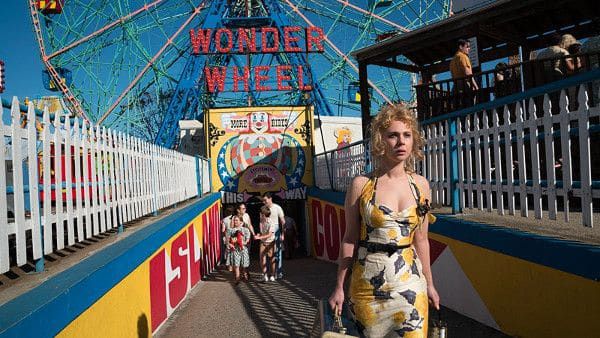Eye For Film >> Movies >> Wonder Wheel (2017) Film Review
Wonder Wheel
Reviewed by: Anne-Katrin Titze

Coney Island in the 1950s is the setting that encroaches on every fiber of the mood in Wonder Wheel which had its world premiere as the closing night selection of the 55th New York Film Festival. The background of the amusement park in sight and sound imposes itself onto every scene and traps the characters socially, financially, emotionally, in a never-ending not-so-merry-go-round. Not since Rainer Werner Fassbinder bathed his stars in harsh pink and blue light in Lola, did the Fifties' false promises seem so inescapable in retrospect.
The cinematography by Vittorio Storaro, the production design by Santo Loquasto, and the costumes by Suzy Benzinger quench possible nostalgia in no doubt purposeful theatrical overkill. This is no longer little Alvy Singer's dreamy memory growing up beneath the roller coaster in Annie Hall. This is the stuff of nightmares with Woody Allen slouching towards Eugene O'Neill.

And right from the start, in voice-over, there is Mickey, the lifeguard, an NYU student who sees himself as the next coming of literature. The full-of-himself poet/dramatist is played by Justin Timberlake and his performance makes all the difference for the tone of the movie. There is no mistaking this beached scribbler's fiendishness to the self-deprecating alter egos the director is famous for.
Recently Allen gave us people that resembled shiny paper cut-out dolls with half a soul, to greater (Emma Stone, Colin Firth, Kristen Stewart in the period pieces such as Magic In The Moonlight or Café Society) or lesser effect (Joaquin Phoenix in Irrational Man, Cate Blanchett in Blue Jasmine). Timberlake's grinning Mickey is the first character who appears utterly soulless, someone trying to suck up what remains of the souls around him. In Mickey, Allen forges his devil.
Wonder Wheel, as forlorn as it is, is also fully, painfully, creakily alive. When Allen foregoes his crutches, any kind of movie seems possible.
Ginny (Kate Winslet) is married to Humpty (Jim Belushi) who operates a carousel. She works as a waitress in a clam house on the boardwalk and mourns her acting career that never lifted off. They live in an apartment, the former location of a freak show, now turned human aquarium, lit by the changing garish colors of the Ferris wheel.
Her young son, Richie (a very good Jack Gore), likes to go to the movies and set fires. And seeing what is going on at home, you can't blame him. Pyromania has rarely been so appealing. His character is the closest to the Allen period of Radio Days, where affirmation of life was still an option, even if a lot of bridges had to be burnt.
One day, Humpty's daughter from a previous marriage, 26-year-old Carolina (Juno Temple), arrives to hide from her mafia husband. She stays and becomes a waitress in the same shack, wearing the same pungent milky green uniform as Ginny, which doesn't make family life on the boardwalk any easier. Humpty, an aggressive drunk, attempts to stay away from alcohol, Ginny longs for the past that never was by caressing trinkets of tinsel - a cape, a half-forgotten monologue - and Richie, when he doesn't watch Flying Down To Rio, sets his therapist's waiting room waste basket aflame.
Mickey in his swimming trunks, his imbecilic mien of self-worth up, fueled by self-hate, of course, seduces Ginny, the older woman, for fun. Because he can. His commentary tells us what he, superficiality personified, really thinks. The scenes with her family show us how she feels. We see it all. Omniscient as nobody ever is in life. There is no escaping the cruelty. The lights of the fair sink their lives into the tint of cherry and lime Jell-O.
Winslet plays Ginny with some counterintuitive moves. This is precisely the actress's great skill - by not holding back and making this broken woman altogether vulnerable, exposure becomes her shield, truth in pain her weapon. Sometimes things are bad and we make them worse. Sometimes there is no worse.
Wonder Wheel shows us drowning. With the devil as lifeguard at hand. This is the most desperate Allen film ever. Winslet struggles stoutheartedly the never ending humiliations for her character that are deeply engrained in this story. Carolina and Humpty approximate to instruments of small torture. When Mickey and Ginny (notice the jaunty names they were given) stroll through the Japanese Gardens or meet in his Greenwich Village apartment for a tryst, Allen authoritatively chisels out the hell of desolate, doomed romance. Red roses for a blue lady are his funeral flowers.
Reviewed on: 26 Nov 2017















